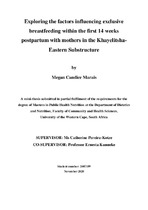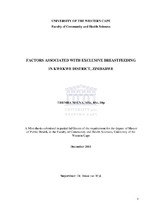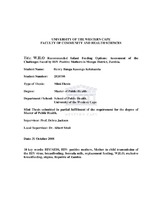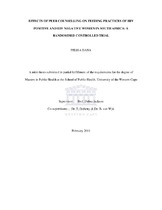| dc.contributor.advisor | Pereira-Kotze, Catherine | |
| dc.contributor.author | Marais, Megan Candice | |
| dc.date.accessioned | 2021-03-30T07:10:29Z | |
| dc.date.available | 2021-03-30T07:10:29Z | |
| dc.date.issued | 2020 | |
| dc.identifier.uri | http://hdl.handle.net/11394/8081 | |
| dc.description | Magister Scientiae (Nutrition Management) - MSc(NM) | en_US |
| dc.description.abstract | Despite evidence-based proof on the benefits of breastfeeding, little progress has been made globally to improve breastfeeding rates (The Lancet, 2016), including in South Africa. Despite many attempts to improve breastfeeding rates worldwide, women are still choosing to stop breastfeeding or avoid it due to various factors (The Lancet, 2016).
Aim: To explore the factors influencing the exclusive breastfeeding rate within the first 14 weeks postpartum with mothers in the Khayelitsha Eastern Substructure. | en_US |
| dc.language.iso | en | en_US |
| dc.publisher | University of the Western Cape | en_US |
| dc.subject | Exclusive breastfeeding | en_US |
| dc.subject | Mixed feeding | en_US |
| dc.subject | Predominantly breastfeeding | en_US |
| dc.subject | Breastfeeding initiation | en_US |
| dc.subject | Breastfeeding support | en_US |
| dc.subject | Khayelitsha-eastern substructure | en_US |
| dc.title | Exploring the factors influencing exclusive breastfeeding within the first 14 weeks postpartum with mothers in the Khayelitsha-eastern substructure | en_US |
| dc.rights.holder | University of the Western Cape | en_US |




